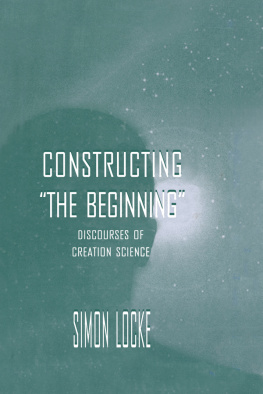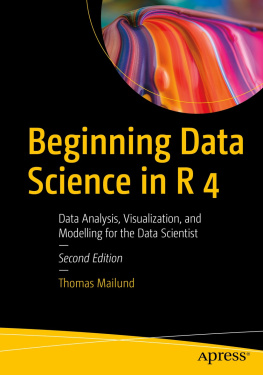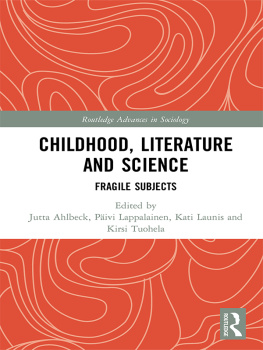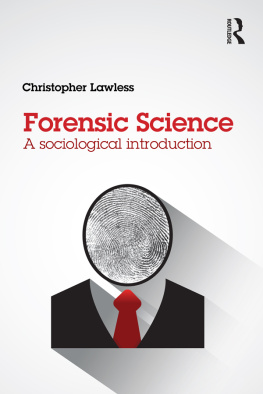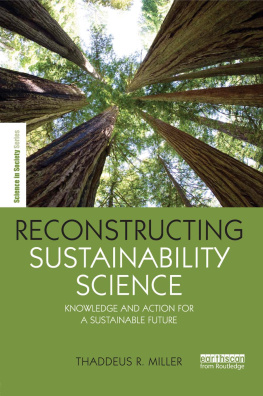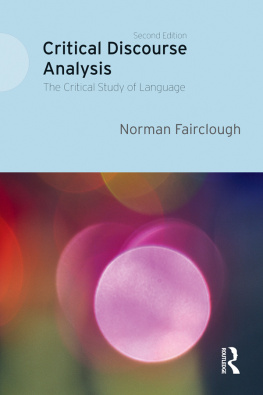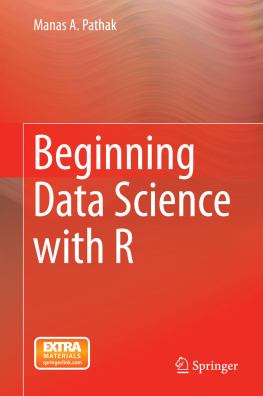Simon Locke - Constructing the Beginning: Discourses of Creation Science
Here you can read online Simon Locke - Constructing the Beginning: Discourses of Creation Science full text of the book (entire story) in english for free. Download pdf and epub, get meaning, cover and reviews about this ebook. year: 1998, publisher: Routledge, genre: Romance novel. Description of the work, (preface) as well as reviews are available. Best literature library LitArk.com created for fans of good reading and offers a wide selection of genres:
Romance novel
Science fiction
Adventure
Detective
Science
History
Home and family
Prose
Art
Politics
Computer
Non-fiction
Religion
Business
Children
Humor
Choose a favorite category and find really read worthwhile books. Enjoy immersion in the world of imagination, feel the emotions of the characters or learn something new for yourself, make an fascinating discovery.
- Book:Constructing the Beginning: Discourses of Creation Science
- Author:
- Publisher:Routledge
- Genre:
- Year:1998
- Rating:5 / 5
- Favourites:Add to favourites
- Your mark:
Constructing the Beginning: Discourses of Creation Science: summary, description and annotation
We offer to read an annotation, description, summary or preface (depends on what the author of the book "Constructing the Beginning: Discourses of Creation Science" wrote himself). If you haven't found the necessary information about the book — write in the comments, we will try to find it.
As a case study of the use of science as a discursive resource in everyday life, Constructing the Beginning speaks to scholars of discourse analysis, constructionism, rhetorics, and the public understanding of science. It will also be of great interest to scholars in the areas of cultural studies, sociology of scientific knowledge and of religion, postmodernism, and sociological theory.
Additional Copy
Creation science is the target of much attack these days from both within and outside of the orthodox scientific community. This book, however, takes a different approach. It is not an attack on creationism; nor is it a defense. The authors interest is not in creationism at all, but rather, it is in the questions of the role and significance of science in modernity or the public understanding of science. Lockes approach to this issue is a discursive and rhetorical one. Creationism is treated as a case study of the argumentative engagement between science and non-science which--in his view--is as central to the commonsense lifeworld of modernity as much as it is to the lives of its intellectuals. An important dimension of the public meaning of science in modernity is its limits and its relations with other modes of thought and belief, which continue to survive as discourses in the wider culture. Creationism is merely one example of this general feature.
The book begins with a discussion of the current issues in the public understanding of science in relation to traditional sociological views of the impact of science on modernity. This is examined through rationalization and the contrasting view derived from the sociology of scientific knowledge which points to the likelihood of a much more complex and variable relationship than rationalization proposes. It continues with an argument and detailed analysis that focuses on three main points:
*the problem of a competing account of reality (the world), in the form of evolution;
*the problem of competing accounts of the Bible (the Word), in the form of different versions of Christianity; and
*the realization that both of these problems must be managed together in such a way that creationists own version(s) of the world and of the Word are compatible--a compatibility achieved through a discursive syncretism.
The final chapter brings together the strands of the argument to further develop the implications of the dilemma of science for the public understanding of science through the idea of science as a cultural resource and its possible relation to other such cultural resources within modernity--such as Christianity. It is suggested that much so-called anti-science could be made sense of in these terms and proposes further research in this direction.
Simon Locke: author's other books
Who wrote Constructing the Beginning: Discourses of Creation Science? Find out the surname, the name of the author of the book and a list of all author's works by series.

